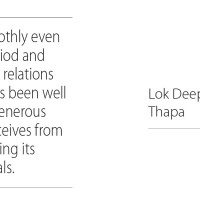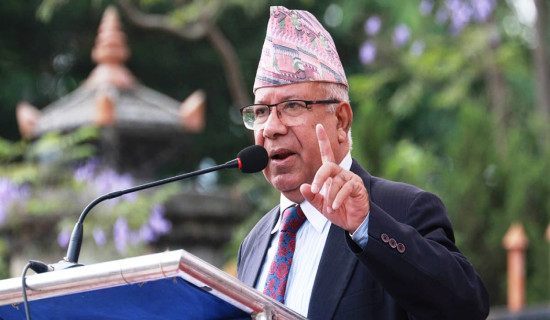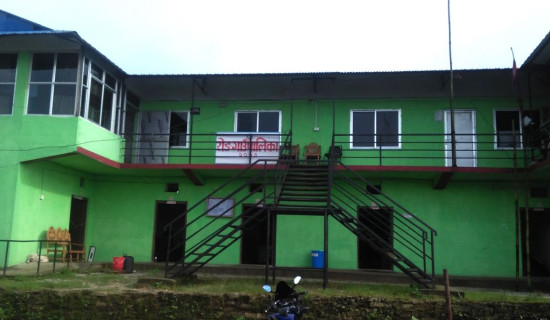- Saturday, 27 July 2024
Implement Development Projects In Time
Nepal is a least developed country on the threshold of becoming a developing country in 2026. For this, it is imperative for the country to embark upon and complete infrastructure development projects. The government has also prioritised development projects, designating vital projects as national pride projects. There are over twenty such projects. However, the malady with development projects is that they are hardly completed within the given timeframe.
Infrastructure development projects include roads, bridges, water supply and sanitation systems, electricity and so on. Delays in the completion of such projects have hampered economic development and growth. The people for whose benefit development projects are initiated are suffering a lot. Such delays have not occurred in one or two instances; they are occurring perennially. As per a report of the World Bank, there is usually a lag of 37 months in public construction industries and only 15 per cent of the works are completed in time.
Repercussions
There are several repercussions of project delays: cost overruns, failure to reap desired benefits and achieve economic goals. To prevent or at least minimise such delays, effective project management and oversight are essential. Project management includes scheduling, coordinating and regulating resources to attain the set targets. It also includes identifying potential risks and taking steps in time to mitigate them. On the other hand, project oversight is associated with monitoring and evaluating projects, ensuring compliance with the terms of the projects and identifying and resolving issues promptly.
Nepal is a cash-straitened country. There are problems with managing financial resources. In an annual budget, funds are allocated for recurring expenditure and capital expenditure. On the one hand, the government says there is a crunch of financial resources, while on the other even all the funds earmarked for capital expenditure are not utilised. This goes on to show that the government does not have the capacity for fully spending on development works.
There is no doubt that funds should be allocated for development projects that are to take off. But in our context, sometimes funds are earmarked for such projects as are not ready to be commenced. The KP Oli-led government in April 2021 announced the commencement of 165 strategic road projects for each of the electoral constituencies. Environment impact assessment and detailed project reports have not been completed for most of the projects. The fate of the grand projects is almost in oblivion now.
There are several hurdles that have to be overcome before starting a development project. A detailed project report has to be completed in time. But there is often delay in completing such a report. There may also be issues of land acquisition. Such issues are arduous to solve. It is difficult to satisfy the locals. They may demand huge compensations for their land. Sometimes, they may be instigated by political leaders to unnecessarily protest. Likewise, there may be issues of forest clearance. Further, government officers responsible for forest clearance may delay in granting permission for construction for years even if the government has approved the construction.
The Gautam Buddha International Airport, the Pokhara International Airport and the Upper Tamakoshi Hydropower Project have been completed. The Melamchi Drinking Water Project is yet to be fully completed. The construction of the Nijgadh International Airport is uncertain. The construction of the East-West Electric Railway is moving at a sluggish pace. Delays in project construction can also be ascribed to delayed budget releases. The process of releasing budgets is long and complicated. There are several instances in which construction works have to be halted while in progress, causing inconvenience to the people. The roads dismantled for re-construction but abandoned for lack of a budget allocation, for example, are a case in point.
The government blames contractors for not completing the works assigned to them in time. One contractor can get several contracts at the same time. Sometimes, they may make away with the mobilisation money or other payments without completing the works. On the other hand, contractors blame the government for delays in works owing to delayed payments. They say that they have to receive payments running into billions of rupees. It need not be reiterated that without infrastructure development, it is not possible to achieve desired economic development. But the fate of development projects leaves much to be desired. As the issue of delayed development projects is chronic, the government should develop a mechanism for accelerating the completion of development projects.
Financial resources
As far as embarking upon a development project is concerned, financial resources hold the key. So before initiating a development project, the funds required for the project should be ensured. Necessary studies such as detailed project assessment and environment impact assessment should be completed in time. Coordination with the locals should also be established so that the issue of land acquisition can be resolved amicably. Further, forest clearance and other issues should be settled in time. There are several people involved in development projects. The government and its officials, contractors, locals and donor countries or agencies may be involved in such projects. They contribute to making a success of development projects.
If all of them work sincerely, there is no question why such projects should fail to be completed in time. So the time has arrived for Nepal to complete all the remaining national pride projects and commencing other projects with a clean slate. After all, the country is graduating to the status of a developing country in 2026. And the country is also bound to fulfil the Millennium Development Goas (MDGs) by 2030. Making desired progress in the infrastructure development sector would also ensure sustainable development. For this, the most important factor is the government’s will. There is no doubt about it.
(Maharjan has been regularly writing on contemporary issues for this daily since 2000.)














